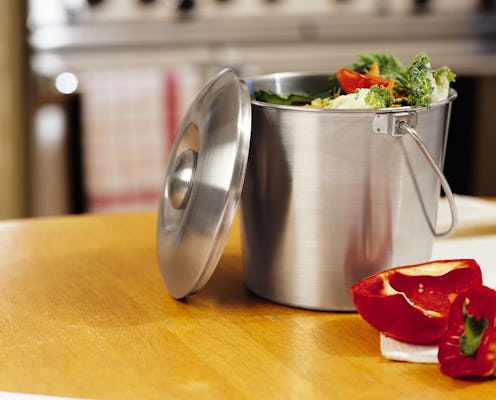Life
4 Things You Need To Know Before You Start Composting In Your Tiny Apartment
If you're at all eco-conscious, it's always time to take a cold, hard look into the garbage can. Of course you're recycling already, but a part of you knows that every banana peel you toss in with your paper towels, your meat trimmings, your old food packages, is a piece of food that could similarly be recycled by composting. You may have heard that composting in a small apartment may not smell ~great~, but it's totally possible to do it without stinking up the place. You don't need an expansive backyard to turn your old apple cores into soil gold.
According to the United States Environmental Protection Agency (EPA), "food scraps and yard waste currently make up 20 to 30 percent of what we throw away, and should be composted instead." That's a lot of egg shells! It doesn't have to be like this. If you compost instead, you could be churning up organic material that assists plants in their growing process. Which is very nice. Think of composting as environmental karma.
To start composting, you need to know a few basic things. First off, what you can compost. It's not like you can throw your potato chip bag in there, and the soil doesn't take kindly to animal products. Small Footprint Family has a considerable list of things you can compost. Now that you're acquainted with compost friendly materials, you can get your lil apartment set up with a not-very-space-consuming composting system. This will work great for either your own garden or to bring to your local composting program. One thing is for sure: getting your small apartment indoor compost set up is way easier than getting your couch through the front door.
1Keep Your Compost On Your Counter
Just like a counter top kitchen appliance — like, a microwave or toaster — you can fit your compost pail in with the crowd. A stainless steel pail like this one from Gardener's Supply Company won't stink up your kitchen (and is p. chic to boot). All you have to do is put your food scraps into the compost, shut the lid to avoid uninvited pests, and collect until it's drop off day at your compost spot. Don't know where to do that? Thankfully Literless, a zero waste website, has compiled a list of places that accept your scraps. This is so simple, you can be saving the world in no time.
2Keep Your Compost In Your Freezer
If you don't have the counter space to spare and don't want to feature your compost as the centerpiece of your coffee table, you can keep your spare odds and ends in your freezer, where they have the added benefit of not breaking down (and therefore, not stinking up the joint). Simply place everything that can be composted into a bag and place it in your freezer until it's time to drop them off. You're basically Captain Planet at this point.
3Bring Worms Into It
If you're looking for roommates, worms might not be able to pay rent but they will take care of your compost. Worms are like little magical compost machines, eating up your food waste and churning out organic matter that help us humans grow food more sustainably. The next time you see a worm, don't scream. Say thank you instead. You can introduce your guests to your worms, if you want to. But if you'd rather your roommates go unnoticed, you can keep your worm bin out of sight. You can find a great set up system on EcoWatch to get started! Just a heads up: Cornell's composting website advises only using "raw fruit and vegetable scraps" with a worm bin.
4Try Bokashi
Quickly gaining traction amongst the composting community is the Bokashi. It's essentially a very hands off approach to composting, and you can toss just about every kind of food scrap in there — even dairy and meat. Through a fermentation process, over the course of a few weeks your full bin of scraps will break down into beneficial microbes that you can bury in your garden or potting containers. Once the microbes snap into action, the roots of your plants will thank you with consistent, beautiful blooms.
